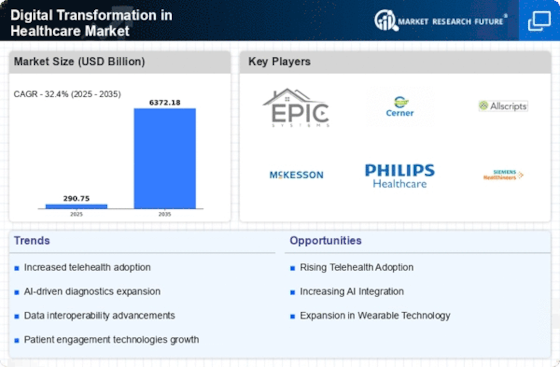Market Share
Digital Transformation Healthcare Market Share Analysis
The Digital Transformation in Healthcare Market is witnessing rapid growth as the healthcare industry embraces technological advancements to improve patient care, streamline processes, and enhance overall efficiency. In this dynamic landscape, companies are adopting various market share positioning strategies to establish themselves as key players in the digital transformation of healthcare.
One prevalent strategy is differentiation, where companies focus on offering unique and innovative digital solutions that set them apart from competitors. This involves investing in research and development to create technologies such as electronic health records (EHRs), telemedicine platforms, and AI-driven diagnostic tools. By providing comprehensive and cutting-edge digital solutions, companies aim to attract healthcare providers and institutions seeking to enhance their capabilities through advanced technology.
Cost leadership is another strategic approach adopted by companies in the digital transformation in healthcare market. Businesses strive to become the most cost-efficient providers of digital healthcare solutions by optimizing processes, leveraging cloud computing, and negotiating favorable agreements with technology suppliers. By delivering cost-effective solutions without compromising on quality and security, companies can appeal to a broader customer base, especially in a market where healthcare organizations often face budget constraints.
Market segmentation is a strategy employed to target specific customer segments with tailored digital transformation solutions. Companies analyze the diverse needs of different healthcare sectors, such as hospitals, clinics, or pharmaceutical companies, and develop specialized digital solutions for each segment. This targeted approach allows companies to address the unique challenges faced by healthcare organizations in specific domains, building stronger relationships and understanding their specific requirements.
Collaboration and partnerships represent another strategic approach in the digital transformation in healthcare sector. Recognizing the complexity of the healthcare ecosystem, companies form strategic alliances with other technology providers, healthcare institutions, or regulatory bodies. These collaborations aim to create integrated and interoperable digital solutions that enhance the overall healthcare experience. By offering comprehensive solutions through collaborative efforts, companies can cater to a broader range of healthcare applications and increase their market share.
Geographical expansion is a vital strategy for companies aiming to strengthen their position in the global digital transformation in healthcare market. This involves adapting solutions to meet regional regulatory requirements, addressing cultural nuances, and establishing partnerships with local healthcare providers. By extending their footprint, companies can tap into diverse healthcare markets and address the growing demand for digital transformation in healthcare on a global scale.
Continuous innovation is key to maintaining a strong market position in the digital transformation in healthcare sector. Proactive strategies involve staying ahead of emerging technologies, addressing evolving cybersecurity challenges, and incorporating advancements such as blockchain for secure health data management. By demonstrating a commitment to technological excellence and addressing the unique needs of the healthcare industry, companies can build trust with their customers and secure a competitive edge in the rapidly evolving digital transformation in healthcare market.



















Leave a Comment